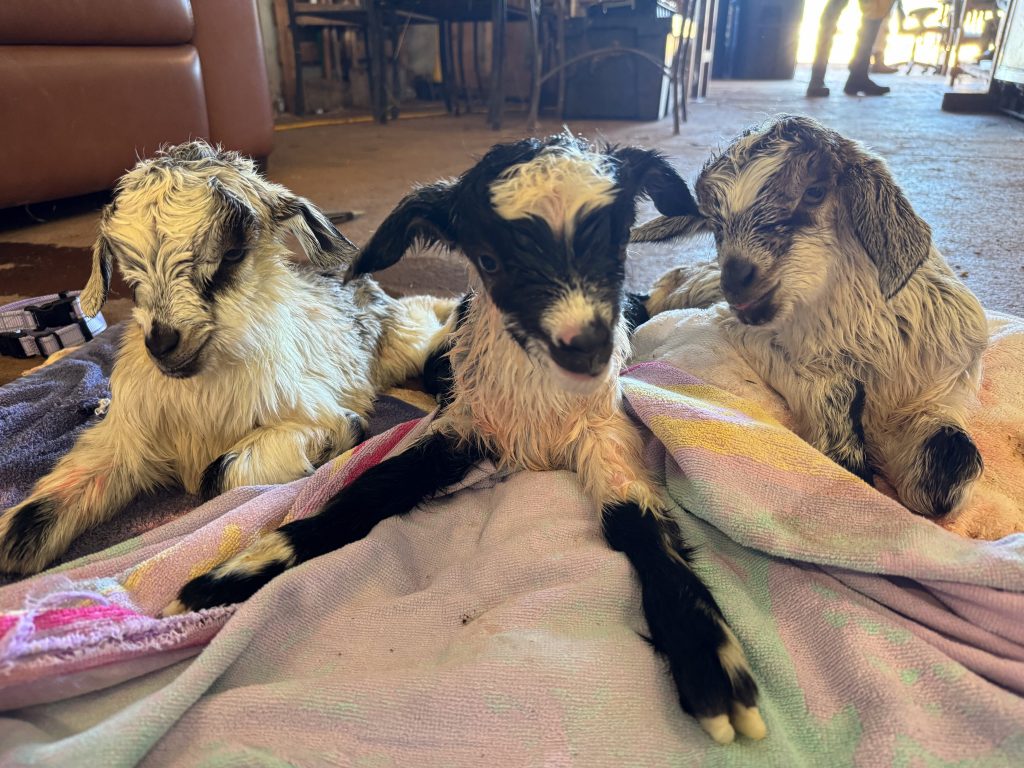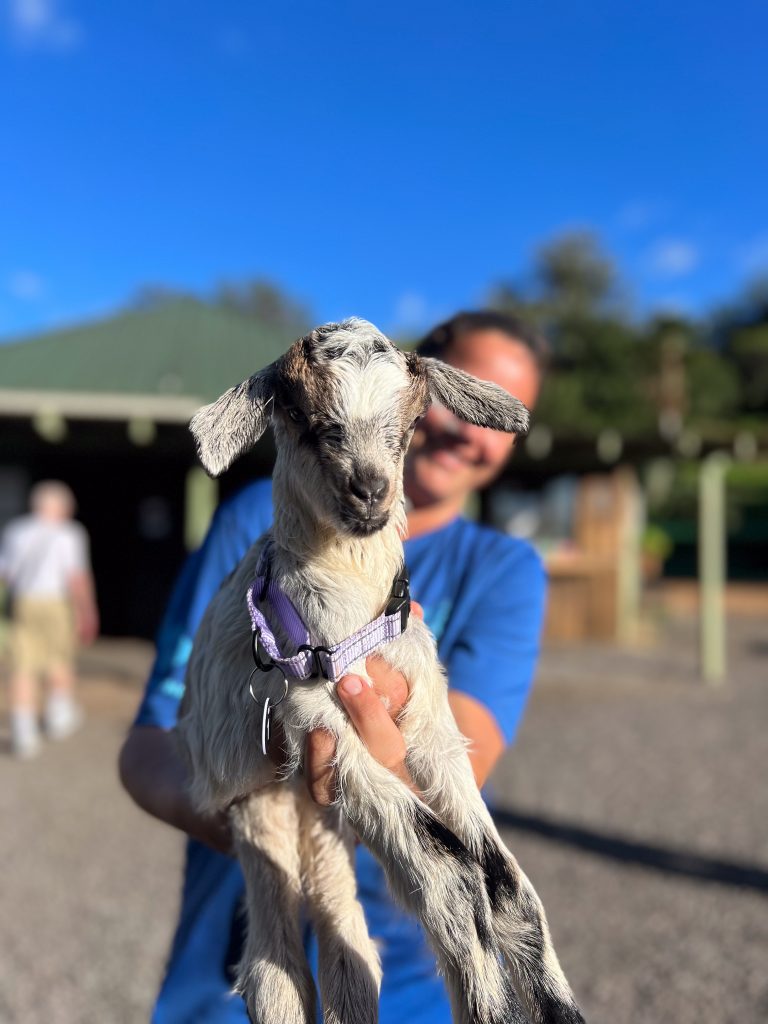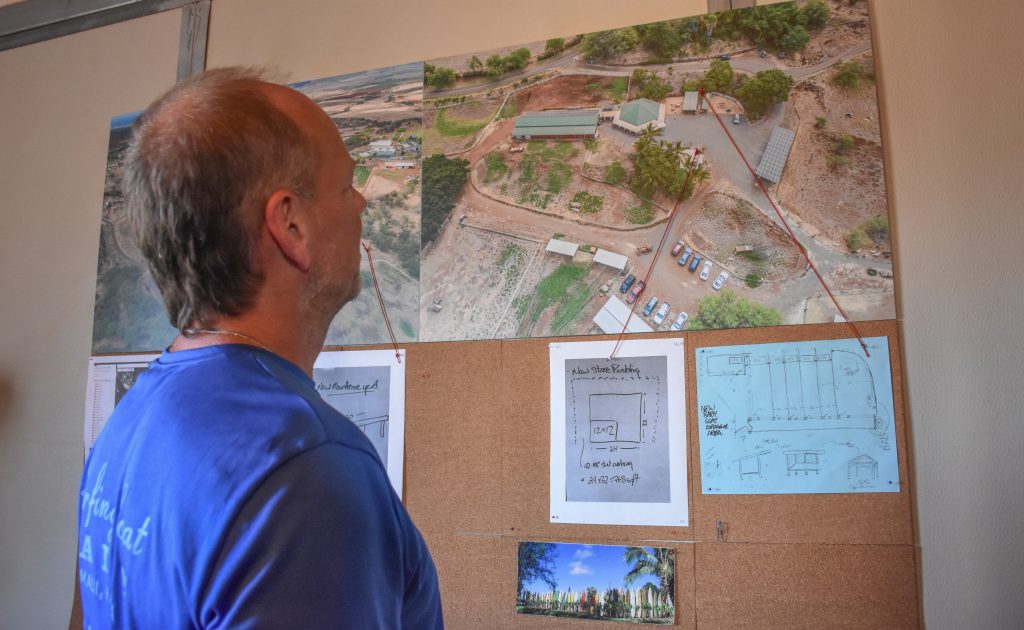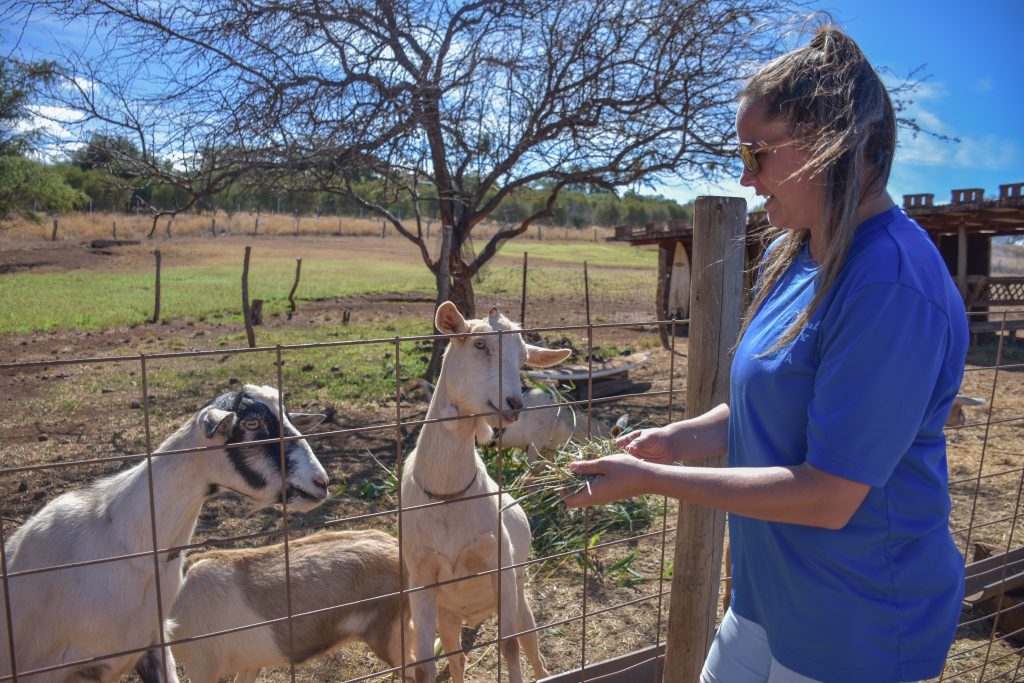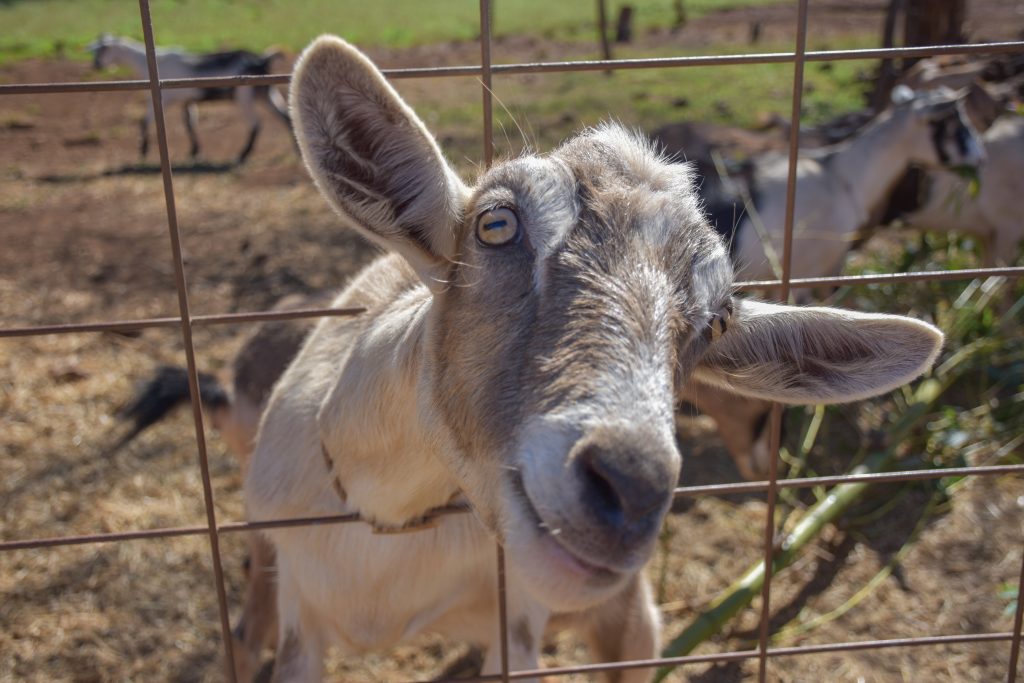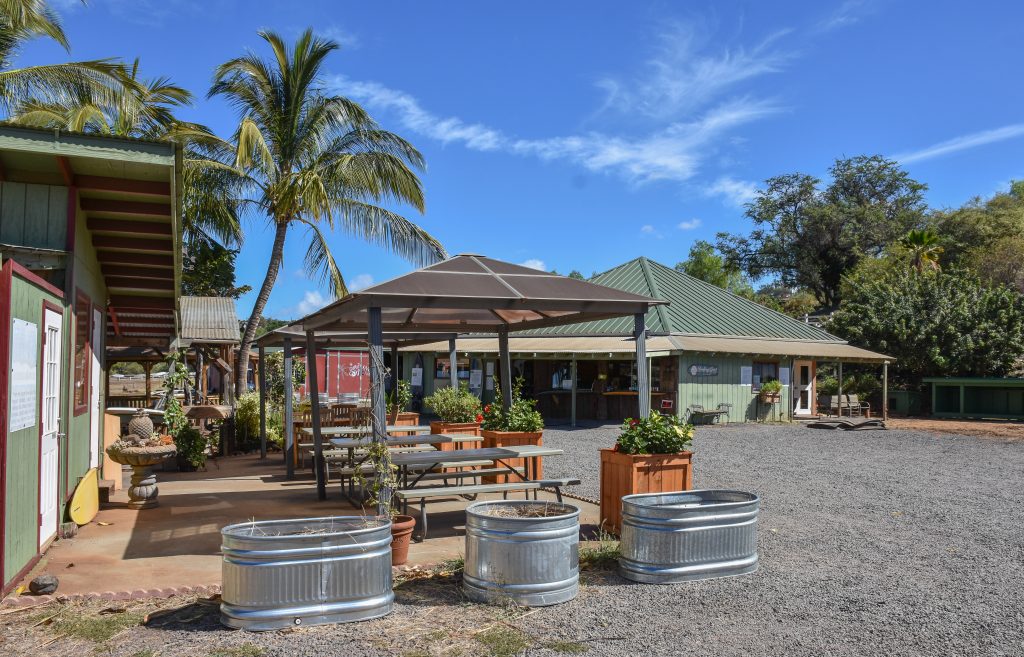Surfing Goat Dairy holding celebration to showcase new owner’s revitalization plan

After decades in the corporate world in Canada — with stints owning coffee, online grocery and liquor import businesses, and most recently helping a cannabis company go public — Jay Garnett decided it was time to get good at polo.
And he did. But he also ended up in a hospital in California with punctured lungs, broken collar bones and eight broken ribs suffered when his horse Tucumana slipped during a major tournament. As he laid in bed unable to sleep from the pain, Garnett pondered what was next.
His 3-month polo stint made him realize he loved being on horses, at the barn, and in the sun with his dog Billy. So he thought: “What if I just bought a ranch and took people for trail rides and just had fun? And so I literally from the hospital room started Googling ranches for sale in California. You go down rabbit holes.”
And in one of those rabbit holes popped up a farm in Upcountry Maui. And that’s how the 52-year-old ended up the new owner of Surfing Goat Dairy.
“I’m fine to dig holes, and shovel poop kinds of things,” said Garnett, who grew up the oldest of six kids on a horse farm in Alberta, Canada. “But at the same time, I can use a little bit of intellectual horsepower and create an amazing guest experience.”
On Dec. 16, about 11 weeks after taking the reins, Garnett is hosting “Goat Day.” It is an event to showcase the new ownership — and the six new pens and gazebo for the baby goats. They are the focus of the first 90-day phase of his 3-year revitalization plan because “the babies are coming.”
About 110 to 120 baby goats are expected to be born this season, with 80 to 85% to arrive from mid December to mid March, said Shannon McCann, whose multiple jobs at the dairy include goat health, customer experiences and community outreach.
And as of Dec. 9, there were eight babies born. On Tuesday, mom Cindy had triplets, all girls. On Friday, another set of triplets were born, as well as twins. All moms and babies are healthy and doing great, McMann said.
At Goat Day, local musician Brian Santana will be playing and seven Maui-based vendors will be set up in an outside area overlooking the valley. The event also will include cheese tastings, keiki activities, including crafts and face painting, and tours throughout the day.
While standing outside his dairy wearing a Maui Strong T-shirt, Garnett excitedly talked about his plans for the 42-acre property, on the slopes of Haleakalā. They incorporate two main missions.
He wants to improve the efficiency of the goat dairy operation that sells wholesale and retail goat milk, goat cheese, goat cheese truffles, banana bread and lilikoi cheesecake. And he wants to turn the farm into a must-see visitor attraction for Upcountry, as is the case with his neighbor, Ocean Vodka Organic Farm & Distillery.
On Oct. 2, after 1 1/2 years of due diligence and negotiations with German owners Eva and Thomas Kafsack, Garnett and his business partner, David Beck of Vancouver, completed the $5.4 million purchase of the dairy farm. It came with a 2,500-square-foot, 3-bedroom, 2-bath home with a spectacular view that Garnett now lives in.
The Kafsacks put the farm on the market for $6.5 million in June 2021, after going through the economic-trying COVID-19 pandemic. They had bought the property for a bargain in 1999 for $620,000. The property had sold for $9 million in 1990.
The Kafsacks originally wanted to build a bed-and-breakfast, but ended up creating the goat business, naming it after their passion for wind surfing.
When the Surfing Goat Dairy randomly popped up during Garnett’s hospital bed search, he knew it was fate, saying he had always thought he would retire on Maui, where he got engaged and married about 30 years ago. It also was fateful for his investment partner, whose family has had a condo in Kīhei for decades.
Garnett walked the property explaining his vision.
“This is where people will be able to watch the baby goats,” he said, pointing to an area that has been cleaned up in preparation for the new pens. Also being built is a new small gazebo, where kids can have a baby milking experience or play with them under staff supervision.
“Everything I’m trying to do is very customer centric,” Garnett said. “When I was in consumer packaged goods and branding in retail businesses, I always tried to think of that consumer empathy. Why do I like this coffee shop? Why do I like this restaurant? Why do I like being here?
“So if I’m sitting here and I’m looking at the baby goats, which is always fun, do I want to be looking at some old dog pens with some tarps hanging off of them and I can’t even see the beautiful flowers or something much cleaner and nicer and kind of lower profile?”

The baby goats are arriving because the farm’s two studs, Hemingway and Prince, have done their jobs well.
“Hemingway’s been busy, busy, busy,” McCann said when he stuck his head over the fence during a tour.
But Prince was on the other side of the dairy. The boys butt heads and have to remain separated.
“They’re each very specific to the herds that they get to work with,” McCann explained.
During the tour, an extended family of 11 from Nevada — included five young kids — were enamored with the 250-pound Hemingway and the female goats, some whom had climbed up the fence, hoping for food.

“We signed up for the family deal, which comes with a little trio of cheese that you get to enjoy here,” Joe Canella said. “It’s a nice beautiful day and the kids are so excited about this.”
There is only one other dairy farm on Maui, the smaller Haleakalā Creamery, which also is in Kula. It has about 25 goats on its 5-acre property and specializes in caramel sauces and ice cream.
At Surfing Goat Dairy, Garnett expects his second 90-day phase of the plan will be done by March. A wonky existing building used for storage will be torn down, and an approximately 900-square-foot building will be built for the store, cafe and greeting area. This will enable the existing store to be taken out of the dairy operation building, and be taken over by the truffle makers. It also will provide more space for making new products.
Garnett said it was important to create a greeting area for visitors to learn about what is offered at the farm. In the past, it wasn’t really clear where to start.
He said about 20,000 tourists came to the farm in the past year, but the Aliʻi Kula Lavender farm and Ocean Vodka drew more than double that number.
“So we know there’s lots of people in Upcountry that we can access,” he said. “But if we had 50,000 people come through our gate, we wouldn’t be able to service them the right way. That’s why we’re creating a different structure and flow.”
He said one reason he bought the farm was “the agritourism movement, not just in Hawaiʻi, but everywhere was really starting to push. You see it in Italy. You see it in New Hampshire. You see it everywhere. And this is a very unique property, a special place, but itʻs been left behind a little bit.”
Garnett’s plans also call for the dairy to host small markets primarily for vendors who sell jewelry, art and sculptures, but not produce.
“I don’t want to compete with what the local people are doing up the road with the farmer’s market,” Garnett said.
He also isn’t planning to charge vendors to use the space. It’s a “win-win,” with rotating vendors providing part of the overall experience at the farm. “You now, like Pike Street Market in Seattle,” he said.
While doing his due diligence before buying the property, Garnett pretended he was a guest at resorts on Maui and asked the concierges where he should bring the family Upcountry.
“None of them would say the goat farm,” he said. “And Iʻd always say: ‘I heard there was a goat farm. And they would be like, ‘Yeah, it’s there. But it’s kind of kitschy.’ … They were struggling to recommend us.”
He has spent the first seven weeks cleaning up the place, which has included taking 50 loads of junk to the landfill. He also is working on repairing an irrigation system that has left much of the fields brown. He plans to plant palm trees with string lighting for upcountry dinners, and create a grassy area with picnic tables and some corn hole games.
“People can just have fun up here,” he said.
Garnett, who employs 17 people, also is working on making the operation more consistent.
“At the high point of the year, we’re getting about four quarts a day out of a goat; and at the low point of the year, you’re getting nothing during your dry kidding season,” he said. “So if our wholesale account Hula Grill is ordering 40 pounds a week, they want 40 pounds a week. Right. But some weeks I have lots and some weeks I have little.”
He said he is working to balance the wholesale business, the retail business and feeding the babies — which all need the pasteurized goat milk.
Garnett said he is also working to become part of the community, which includes buying local bananas for his banana bread.
“I think it’s our kuleana [responsibility] to be able to be part of Upcountry, be part of the island, be part of the fabric,” he said.
There are three kinds of goats on the farm: La Mancha, easily recognizable by their very short ear pinnae, French-Alpine, with erect ears, and Swiss Saanen, the top milk producer.
The herds may even have a side hustle chowing down on fields for a form of mowing and wildfire prevention.
“Shannon and I were looking into it,” Garnett said. “It’s called goat-scaping. You would actually rent the goats from us. We would trailer them over to your field, leave them there for like 10 days while they mow down your field and then kind of move them to somebody else.”
But for now, there is “Goat Day” to prepare for.
The Surfing Goat Dairy Farm at 3651 Omaopio Road in Kula is open Tuesdays through Saturdays, from 9 a.m. to 5 p.m. Tours are offered on the hour, except at 1 p.m.





